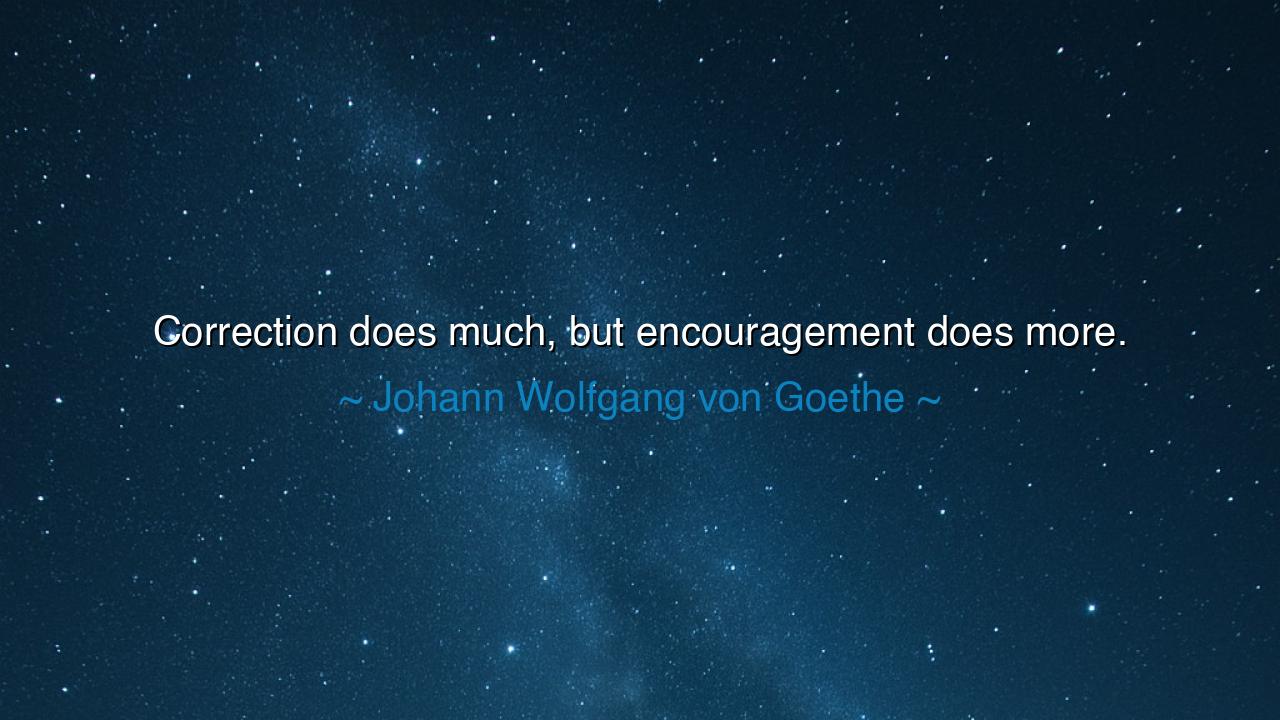
Correction does much, but encouragement does more.






Hear, O seekers of wisdom, the voice of Johann Wolfgang von Goethe, poet, philosopher, and sage of the human soul, who declared: “Correction does much, but encouragement does more.” In this utterance lies a truth as ancient as the mountains and as fresh as the dawn: that the shaping of human character is not wrought by rebuke alone, but by the light of affirmation. For while correction may restrain folly and guide the errant path, it is encouragement that breathes life into the weary, that awakens hidden strength, and that lifts mortals to heights they did not know they could reach.
The meaning of this teaching is twofold. First, that correction is necessary; without it, the soul wanders aimlessly, the student repeats error, the worker drifts astray. Yet correction alone is cold—it scolds the hand but does not strengthen the heart. It may halt failure, but it does not create greatness. Encouragement, however, fills the spirit with courage, making the soul not only willing to avoid error but eager to attempt the impossible. It transforms effort from duty into joy, and joy multiplies effort beyond measure.
The origin of these words flows from Goethe’s own life. He lived not only as a poet but as a mentor, a thinker, and a leader of minds in an age of transformation. He observed men and women as they struggled to grow and create, and he knew that fear of punishment or shame could push them only so far. But when given a word of hope, when praised for their progress, their strength multiplied. He saw in this the greater truth—that affirmation builds bridges where criticism builds walls.
Consider the story of Franklin D. Roosevelt, who, crippled by polio, might have remained broken in body and spirit. Many could have corrected him, pointing to his limitations. But it was the encouragement of those around him, and his own faith in possibility, that lifted him to lead a nation through depression and war. His life was not shaped by correction alone but by the sustaining power of belief—belief given, received, and shared.
Think also of Anne Sullivan and her student Helen Keller. Sullivan corrected Keller’s mistakes, yes—but if she had relied only on correction, Keller might have remained locked in despair. Instead, Sullivan filled her with constant encouragement, celebrating each tiny breakthrough, nurturing each fragile success. That encouragement became the light that guided Keller out of darkness, and through it, she became a beacon to the world. Her life stands as eternal proof that encouragement does more than correction ever could.
O children of tomorrow, learn this: to correct is to prune the tree so it does not wither, but to encourage is to nourish it so it bears fruit. Correction may stop harm, but encouragement inspires creation. Correction may show the way, but encouragement gives the will to walk it. The greatest leaders, the greatest teachers, the greatest parents are those who know how to balance the rod of correction with the balm of encouragement.
Practical wisdom calls you: do not withhold correction where it is needed, but let your words be gentle, and let them always be followed with hope. More often, choose encouragement. Speak words that strengthen, affirm, and uplift. When others falter, remind them not only of their errors but of their potential. When they succeed, however small the triumph, celebrate it loudly, for such celebration multiplies the desire to achieve more.
Therefore remember the counsel of Goethe: “Correction does much, but encouragement does more.” Let it guide your dealings with others and with yourself. For in encouragement lies the power to transform failure into growth, weakness into strength, despair into hope. The soul thrives not in the shadow of constant correction, but in the sunlight of encouragement. Be, then, a bearer of that light, and you will see those around you blossom into their fullest selves.
––






IIT
I love how this quote captures a timeless truth about human nature. It’s not that correction is bad, but that encouragement gives people energy to act on that correction. I wonder if this principle applies equally to self-growth. Can we encourage ourselves effectively, or does encouragement work best when it comes from others? Maybe self-compassion is just another form of encouragement that fuels personal progress.
LLinh
This statement resonates with me deeply because I’ve personally experienced both sides—being corrected and being encouraged. I’ve noticed that encouragement tends to make me want to improve on my own, while correction sometimes feels like pressure. Does this mean that emotional connection plays a bigger role in growth than instruction itself? Perhaps people change most when they feel supported rather than simply directed.
DLDilys Lun
I find this perspective really heartwarming because it reminds me that emotional support can be just as powerful as practical advice. In workplaces or schools, though, correction is often emphasized more than encouragement. Why do you think that is? Maybe people underestimate how much motivation and confidence can influence performance. Should leaders and teachers be trained to give feedback that builds rather than just critiques?
TNThanh Ngoc
This quote makes me think about how different people respond to feedback. Some thrive on being challenged, while others shut down when criticized. Do you think encouragement always works better than correction, or does it depend on the person’s mindset and maturity? Maybe real growth requires both—correction to refine our actions, and encouragement to keep us believing we’re capable of doing better next time.
Nnhi
I really appreciate the wisdom in this quote because it highlights how motivation often grows stronger through kindness than criticism. Still, I can’t help but wonder—how do you balance the need for correction with the power of encouragement? Too much correction can discourage people, but too much encouragement without honesty might prevent growth. What’s the right mix between constructive feedback and uplifting support in helping someone improve?